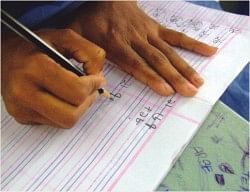
By Sabrina F Ahmad
 |
Photo by Sabhanaz Rashid Diya |
You must have seen the Idea! ad on the Indian channels, featuring Abhishek Bacchan as a priest, praising the idea for using a cell-phone to take primary education to the remote villages. If you've been to Kolkata recently, you're bound to have seen huge billboards proclaiming "Let's contribute to our nation's CGPA". So why are the peeps next door, who are arguably one of the better developed nations in this region, still so concerned with primary education? Perhaps the answer lies in the question itself.
Let's look at how ordinary people achieved extra-ordinary results using the power of education.
Ain't no mountain high enough
In 1993, a young mountaineer named Greg Mortenson attempted to Pakistan's K2, the world's second highest mountain in the Karakoram range. When a series of complications dashed his hopes for reaching the summit, he found himself stumbling, lost and disoriented, through the harsh terrain of Pakistan's Northwest Frontier. Thus it was that the man arrived at the village of Korphe, where he collapsed from sheer exhaustion. The villagers came forward to help him, and as he recovered, he became aware of the abject poverty in which these people lived. It was the sight of Korphe's children scratching numbers on dust in lieu of a proper school, however, that really got to him, and he left the place, vowing to return and build a proper school there.
The spur-of-the-moment promise led, through a series of mishaps and minor miracles, to a remarkable humanitarian campaign, in the form of the Central Asia Institute (CAI), dedicated towards promoting education and literacy, especially for girls, in remote, volatile regions of Pakistan and Afghanistan. As of 2007, Mortenson has established over 61 schools in rural and often volatile regions of Pakistan and Afghanistan, which provide education to over 25,000 children, including 14,000 girls, where few education opportunities existed before. Even by itself, it is a remarkable feat, but in the wake of the events following 9/11 the importance of the venture became even more important.
In the words of Kevin Fedarko, in his article "He Fights Terror With Books", "As the U.S. confronts Saddam Hussein's regime in Iraq, Greg Mortenson, 45, is quietly waging his own campaign against Islamic fundamentalists, who often recruit members through religious schools called madrasas. Mortenson's approach hinges on a simple idea: that by building secular schools and helping to promote educationparticularly for girlsin the world's most volatile war zone, support for the Taliban and other extremist sects eventually will dry up."
Mortenson himself says “We've spent billions of dollars building a wall around America with homeland security, but we also need to reach out to build bridges. If we try to resolve terrorism with military might and nothing else, then we will be no safer than we were before 9/11. In the long-term, we have to help feed and clothe people where terrorists are recruiting volunteers. And we have to educate themespecially the girls. We have to prove to them that the world can be a better place. If we truly want a legacy of peace for our children, we need to understand that this is a war that will ultimately be won with books, not with bombs.” Braving fatwas, kidnapping threats, landmines, and, more painfully, harsh criticism from those of his own countrymen who continue to equate Islam with terrorism, Mortenson continues to revisit the tall mountains and harsh climes of these far-flung regions, bringing the light of hope to thousands of lives.
 Street smart
Street smart
It started with a stubborn media executive on a holiday to Manila, who refused to stick to the 'safe' streets, and decided to take a taxi through the historic Spanish Quarter. Looking for novelty, perhaps, Jane Walker was confronted by squalid scenes of poverty inside. As she reeled from the sight of slums and ragpickers, she came across a woman in an asbestos hut inside a cemetary, trying to teach a bunch of kids how to read. By this time, Walker was so overwhelmed with everything she was seeing, she blurted out a promise to build a proper school for the children.
Returning to her home in Gloucester, Walker began to raise money for her project. Devoting herself full-time to the project, she quit her job, and tried everything from skydiving to shaving her hair off to garner funds. At one point, she even ended up as a jobless single mother (JK, anyone?). By end 1998, though, she had raised $9850 to build a basic reading and day-care centre for the children at the cemetary. The seeds of a vocation had been sown, and Walker went on to found the Philippine Community Fund, a charity devoted to improving the quality of life for the poorest Filipino communities, through education, nutrition, health, medical and family enhancement programs.
The Philippines has long been incapacitated by an economy woefully equipped to support a rapidly-growing population on course to reach 111m by 2015. While increased foreign competition has eroded profitability of its electronic and clothing industries, political fragility, cumbersome bureaucracy and corruption have further deterred potential investment. The result is one-third of government revenue is used to pay off interest on the nation's debts, ensuring health, public services and education remain low priorities. State schools, for example, are chronically overcrowded and 70 children per class is not uncommon. But at least they are in school. The celebration which marked the opening of Jane Walker's school amid the tombs of Navotas cemetery was therefore understandable.
The P.C.F aimed to improve the quality of life for the dumpsite families and empower them to change their working environment. To this end, the provision of pre-school education would be supported with feeding initiatives, clean water programmes and preventative medical assistance.
Today the charity's three schools - plus one partner school in Bacolod City - educate over 500 children. Each child has received a uniform and shoes and they now enjoy a daily lunch.Some 160 pupils in the 8-16 age group have never been to school before and are being educated in special classes to enable them to join mainstream education later on.Only the most marginalized children gain access to the P.C.F schools, which are registered with the government. And, unsurprisingly, there is a waiting list.In parallel, the P.C.F schools provide literacy and business skills classes for 100 adults while health prospects have been improved this year by the opening of a P.C.F-funded water filter station at Smokey Mountain and a family welfare and health centre at the cemetery.
According to a description by a Hampshire news portal, "A light, albeit faint, is now shining at the end of a very long tunnel. And it's held by a diminutive woman from Southampton who the grateful locals fondly call "Ma'am Jane" - Lady Jane."
The magic door
When looking at how something as basic as primary education can dramatically change lives, one needn't even look very far beyond our own capital city. In 1993, the government declared attendance at school mandatory up to Class 5. Keeping in mind that in a patriarchal society like ours, particularly in the villages, education for female children isn't given much priority, the government also made provisions for scholarships and other awards for female students up to the matriculate level. Government and non-government organizations (NGO's) picked up on these policies with gusto, and took up initiatives such as starting state-supported or NGO schools in rural areas, using media campaigns (the Meena cartoons are just one example), encouraging people to send their kids, both boys and girls, to school. The results were remarkable.
Early this year, as per the requirements for their Live-in Field Experience (LFE) program, compulsory for all undergraduate students of the Independent University, Bangladesh, took to the villages during their Spring Semester. One of the sites chosen for their study was Manikganj, and yours truly got to tag along to check it out. In the villages we visited, all the children, regardless of the financial state of their parents, was enrolled in either a government school, or an NGO one. With a generation of education already implemented amongst women, we found that the young mothers in the village were way more empowered than women of the preceding generation. They were able to appreciate the importance of immunization, and were more pro-active about birth control choices. With a basic education under their belts, some supplementary vocational training as well, there were also more career options available to them, so that we found plenty of young women working in the NGO farms, mills, and projects, adding to the family earnings. The rate of child marriage had also gone down in the area, even as health awareness had improved. The men too, had picked up valuable skills such as learning how to operate rice-husking machines, or repair-work, that also helped them increase their occupational mobility.
While the village we visited, or even the case of CAI and PCF could have simply been exceptional cases amidst a more sordid reality, the truth remains that these are cases where primary education has opened doors for people. Whether we're fighting terrorism, or poverty, or just looking for a better life, maybe the pen IS a more effective weapon than the sword.

